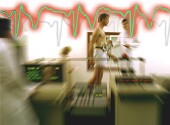Key Protein Limits Damage of Heart Attack
Activating Gi compound in mice was important protective mechanism, researchers say.
|
E-mail this article
Subscribe to news
Printer friendly version
|

(SOURCE: Thomas Jefferson University, news release, March 2008)
FRIDAY, March 28 (HealthDay News) -- A signaling protein called Gi plays a critical role in protecting the heart during a heart attack, say researchers at Thomas Jefferson University in Philadelphia.
It was already known that Gi increased activity in a failing heart, but it wasn't clear whether the protein was helping the heart adapt to damage or if it actually caused more heart cells to die.
In this study, the researchers created mice that lacked a working Gi gene, simulated a heart attack, and then restored blood flow to the heart. These mice suffered more heart damage than mice with a normally functioning Gi gene.
"It appears that in this setting, Gi is an important protective mechanism," team leader Walter Koch, a professor of medicine and director of the Center for Translational Medicine at Jefferson Medical College, said in a prepared statement.
"The heart wants to activate Gi and attempt to protect cardiac myocytes from dying. We found that in this acute setting, heart attacks are bigger when Gi is blocked," he said.
The study was published in the March 18 issue of Circulation.
Gi plays an important role in intracellular signaling, similar to a molecular switch, explained Koch. Gi is not a new drug target, but the activation of certain receptors (such as beta-2 adrenergic receptors) that also turn on Gi could be drug targets.
Koch said developing a "class-specific Gi inhibitor" is a vital step in learning more about Gi's role and behavior.
"We don't have to worry about what the receptor we are blocking; we're blocking a receptor that couples with Gi. We never had the tools before to tell if Gi activation was good or bad. We think that we can now begin to test the role of Gi in cardiac injury," Koch said.
More information
The American Heart Association has more about heart attack. 
Copyright © 2008 ScoutNews, LLC. All rights reserved. 
HealthDayNews articles are derived from various sources and do not reflect federal policy. healthfinder.gov does not endorse opinions, products, or services that may appear in news stories. For more information on health topics in the news, visit the healthfinder.gov health library.